- Home
- Patrick O'Brian
A Book of Voyages
A Book of Voyages Read online
For M. from P. with love.
CONTENTS
COVER
TITLE PAGE
DEDICATION
FOREWORD
PREFACE BY VARIOUS TRAVELLERS
PLEASANT TRAVELS BY LAND
1. Lady Craven: Vienna to Constantinople
2. Dr. John Moore: Prince Esterhazy’s Garden
3. Dr. Gemelli-Careri: Venice and the Carnival
THICKNESSE’S GENERAL HINTS TO STRANGERS WHO TRAVEL IN FRANCE
UNPLEASANT VOYAGES
1. The Distresses of the Unfortunate Crew of the Ship Anne and Mary
2. The Loss of the Luxborough
3. The Sufferings of Six Deserters going from St. Helena to Brazil
4. Fra Denis de Carli in the Congo
5. The Wonderful Preservation of the Ship Terra Nova
PELLHAM’S VOYAGE TO GREENLAND
ORIENTAL SPLENDOUR
1. Sir Thomas Roe: The Mogul’s Birthday
2. M. Tavernier: The Mogul’s Peacock Throne
3. Mr. Bell: Hunting with the Emperor K’ang Hsi
4. The Nabob’s Lady
THE INDEFATIGABLE TOURIST
INEFFICIENT PIRATES
1. Sir William Monson’s Tale
2. Everard’s Encounter
COLONEL NORWOOD’S VOYAGE TO VIRGINIA
A LIST OF SEA-TERMS
FOOTNOTES
THE WORKS OF PATRICK O’BRIAN
COPYRIGHT
ABOUT THE PUBLISHER
FOREWORD
This collection of voyages has been made from some of those many seventeenth- and eighteenth-century books of travel that are no longer easily to be found. The Elizabethan voyages and the more famous later travellers have often been reprinted, and most public libraries can supply Hakluyt and Purchas, Dampier, Anson and Cook. The big eighteenth-century collections, however, have not found modern publishers, and it is not likely that they ever will, for they are inordinately long and their hundreds of maps and engravings would be far too costly to reproduce.
Nearly all these collections (and there were dozens of them) were designed to give a view of the known world: they were intended to act as a kind of encyclopaedic geography, and the voyages were often constrained to suit the system. The result of this treatment was undoubtedly useful at the time, but a determined editor would often mangle an interesting voyage cruelly, extracting commercial and geographical facts and relating them in a uniformly dull manner. A melancholy example was the Abbé Prevost, whose Histoire Générale des Voyages fills some twenty insipid quartos.
Of these collections perhaps the most enjoyable is that called Churchill’s. It is an anonymously compiled work published in four handsome folio volumes by A. and J. Churchill in 1704; they brought out another edition in six volumes in 1732 and lastly an eight-volume edition in 1752. Churchill has the virtue of being the least systematic of the collections; when the original voyage is in English Churchill’s editor leaves his author alone, or at the most makes no alteration more ambitious than modernizing the spelling, which is hardly offensive at this length of time. Churchill had access to several manuscripts, the most important being that of Sir William Monson’s Naval Tracts, and he appears to have printed them with scholarly accuracy.
Most of the collections use much the same material, but as Churchill shows most respect for his authors, I have used him as the main provider for this book, though I have gone to the original wherever there has been an earlier printed version.
The text is integral in the case of the complete voyages; I have given it exactly as I found it, down to the last inconsistency in spelling. The extracts have been edited, but the editing has been confined to excision, and every cut, except in Lady Craven’s journey, is shown. There are no footnotes except those of the original authors. Editor’s footnotes seem to me out of place in a work of this kind; they spoil the impression of reading the original text, they ruin the appearance of a page, and if they tell you anything new it is often annoyingly trivial. The only notes are short biographical and bibliographical remarks at the beginning of the accounts, and a list of sea-terms, taken from various eighteenth-century sources, at the end of the book.
Most books of voyages say in their prefaces that they intend to be useful. “Let us have no unnecessary ornamentation at the outset of a work in which we propose nothing but the weighty and the useful,” begins one; they hardly ever speak of giving entertainment.
The intention of this book is quite different; its first aim is to give the reader pleasure. It makes no claim to being a scholarly work, and it has no didactic purpose. If the reader draws instruction or edification from it as well as pleasure that is his own affair, and beside the bargain.
PATRICK O’BRIAN.
PREFACE BY VARIOUS TRAVELLERS
… for thy more easier understanding, I have divided this … into … parts … which being seriously perused, doubtlesse thy Labour shall receive both profit and pleasure. Accept them therefore with the same love, that I offer them to thee, since they cost thee nothing but the reading, but how deare soever they are to me. But understand me better, I scorne to draw my Pen to the Ignorant Foole, for I contemne both. To the Wise I know it will be welcome; to the profound Historian yeeld knowledge, contemplation and direction: and to the understanding Gentleman, insight, instruction, and recreation: and to the true bred Poet fraternal love, both in meane and manner. Now as touching the hissing of snakish Papists, a tush for that snarling Crew; for as this Worke, being sensed with experience and garnished with trueth, is more than able to batter downe the stinging venome of their despitefull Waspishness: so also they may clearely see therein, as in a Mirrour, their owne blindnes, and the damnable errours of their blind guiders, Deceivers and Idolaters: and above all the cruel inflictions imposed upon me, by the mercilesse Inquisition of their profession in Malaga; which for Christ’s sake I constantly suffered, in Tortures, Torments, and Hunger.
And lastly, they may perceive God’s miraculous Mercy, in discovering and delivering me from such a concealed and inhumane murther.
And now referring the well set Reader to the History it selfe, where satisfaction lyeth ready to receive him, and expectation desirous of deserved thankes: I come to talke with the scelerate Companion: If thou beest a Villain, a Ruffian, a Momus, a Knave, a Carper, a Critick, a Bubo, a stupid Asse, and a gnawing Worme with envious Lips, I bequeath thee to a Carnificiall reward, where a hempen Rope will soon dispatch thy snarling slander, and free my toylesome Travailes and now painefull Labours, from the deadly Poyson of thy sharpe edged calumnies, and so goe hang thy selfe; for I neither will respect thy Love, nor regard thy Malice: and shall ever and alwayes remaine,
To the Courteous still Observant:
And to the Criticall Knave as he deserveth.
WM. LITHGOW
The Prologue to the Reader, from William Lithgow’s The Totall Discourse of the Rare Adventures, and Painefull Peregrinations of long nineteene yeares Travailes from Scotland … etc. ed. 1640. Lithgow has recently been republished, so I have included none of his travels; however, he says what so many travellers feel on meeting with a doubtful reception at home, and says it with so much force and ability that he must be included: furthermore, I had the good luck many years ago to pick up a battered copy of the 1640 edition for fourpence, so I feel that I have a certain property in him.
There are some men, who will scarce believe anything but what they see, and at the same time will not stir an inch from home to be inform’d.
These sort of creatures are not to be satisfied as to the credibility of any thing beyond their own capacities. But for those who only seek a reasonable testimony and probability to believe things …
(THE TRANSLATOR OF HAMEL, A DUTCHMAN WREC
KED OFF KOREA, 1653)
From
LADY CRAVEN’S
A JOURNEY THROUGH THE CRIMEA TO CONSTANTINOPLE
Lady Craven was the daughter of the fourth Earl of Berkeley; she was born in 1750, and in 1767 she was married to William Craven, afterwards the sixth Earl of Craven.
She and her husband did not agree; in 1780, after she had borne six children, they separated and Lady Craven left England. In the following years she travelled extensively: in a series of letters to her great friend the Margrave of Anspach she described France, Italy, Austria, Poland, Russia, Turkey and Greece, which she visited in turn. She published the letters in London in 1789.
Lord Craven died in 1791, and Lady Craven married the Margrave, whose wife had died shortly before.
From about 1777 until long after her marriage with the Margrave Lady Craven managed to attract a great deal of ill-natured scandal. Her beauty may have had as much to do with this as anything else, although it must be allowed that she was uncommonly indiscreet: she was exceptionally beautiful, as one may see from the portraits by Sir Joshua Reynolds, Romney and Vigée le Brun.
Lady Craven wrote some plays and her memoirs. Walpole, who admired her very much, printed her comedy The Somnambule at Strawberry Hill. Her memoirs appeared in 1826; if you enjoy reading the Lady Craven of the travels it is a mistake to read the Margravine’s memoirs.
Lady Craven died at Naples in 1828.
This extract is taken from A Journey through the Crimea to Constantinople. In a Series of Letters from the Right Honourable Elizabeth Lady Craven, to his Serene Highness the Margrave of Brandebourg, Anspach, and Bareith. Written in the Year MDCCLXXXVI. London: Printed for G. G. J. and J. Robinson, Pater Noster Row. MDCCLXXXIX. In order to get Lady Craven to her journey’s end it was necessary to cut quite a lot out of her account, particularly the extraneous matter, like her copied history of the Crimea. It was a pity, but without it she would have been too long for inclusion. In this case I have not put in the usual dots—the scars of editing—which point the excisions, partly because they spoil the continuity of the text, which I have endeavoured to preserve, and partly because they would conflict very much with Lady Craven’s own system of punctuation.
VIENNA, DECEMBER 14, 1785
I CAME, as I told you I was advised, by a new road; but I should imagine from the difficulties I met with it was the worst,—It is true, some of them were owing to rivers, which, swelled by the late rains, are become torrents which have carried whole villages and many miles of the road before them—
I set out from Venice on the 30th of last month, going by water to Mestre, where my coach and horses met me—
Trevisa, which is the place I next slept at, I arrived at with much difficulty; my coach drawn with ten horses and four oxen—and you can form to yourself no idea of the obstinacy, and provoking phlegm of a German postillion or postmaster—At one place, tired of the snail-like pace I went, I hired a traineau of a peasant, and went on before my carriage—It seems there is an order at every frontier town in Germany, not to suffer strangers who travel without post-horses, to leave the town without staying in it two hours—this the German postmaster did not choose to tell me—nor did he refuse me another traineau and horses, but sat with two other fat Germans playing at cards, without deigning to give me any other answer than Patienza, to any thing I could say to him—when I recollect the scene of these three fat men playing at cards, their figures, and all I said in Italian to persuade the man and his patienza I could die with laughing; however, in about an hour, an officer came in; who looking at me some time, said, Parlez vous Français?—Mon Dieu, oui Monsieur, says I; and I found, the post-master’s deafness proceeded from his not being able to talk Italian very well, French not at all—so he took me for an impatient boy—and sent me to Coventry—When the gentleman called me Miladi, these three fat Germans deigned to look at me, for I must tell you that in this country, the respect paid to our sex is such, that it is enough for a woman to speak, she is obeyed immediately—and I had a traineau—and six horses for my coach ready in an instant. One night I slept at Klagenfurt, a large town, where one of the Emperor’s unmarried sisters lives—I am arrived here at last, through a very beautiful country; but must observe, that whoever wrote L. M.—’s Letters (for she never wrote a line of them) misrepresents things most terribly—I do really believe, in most things they wished to impose upon the credulity of their readers, and laugh at them—The stoves of this country, which she praises so much, are the most horrid invention you can conceive. The country people in Germany seem to fear the cold very much; the casements of their windows are double; and there being no chimney in the rooms, there is no vent for fumes of any sort—so that the breath of the inhabitants of them rests in drops of steam on all the tables, etc. and the stink and suffocating heat that assails the traveller’s senses when he enters any room, particularly where people are, cannot be conceived. I do not believe the German women, of the lower order, are very gentle tempers—for several of them flew into the most violent passions, when I opened a door or window—and shut them again immediately—My only resource upon these occasions was to go out into the yard—
In this town, the German ladies are handsome, accomplished, and civil to a degree you have no idea of; several of them, besides possessing many other languages, read, write, and speak English well; most of the Germans are naturally musicians, and I am sure a young Englishman, with good manners, may every evening here pass his hours in a circle of handsome and accomplished women of the first rank—I have seen no place yet I should so much wish my son to come to as Vienna—Sir Robert Keith assures me he has presented above four hundred noblemen and gentlemen, young countrymen of mine, and has never had reason to complain of them, while we hear and see constantly the follies of the Anglais at Paris, where they go to ruin themselves, equally with the Duchesse or the fille d’opera, and only to be laughed at.
The ladies are tall and fair—more handsome than pretty—There is a great supper at Prince Galitzin’s every Sunday night; and at Prince Par’s every Monday; the first is the Russian minister, who does great honour to his court, by his sense and politeness here—
P.S. I cannot help adding, that the questions asked travellers by the guards at the frontier towns are most ridiculous—are you married or not?—Do you travel for your pleasure or upon business?—Your name and quality?—It put me in mind of a story told me by the Russian Minister at Venice, of a traveller who being asked his name, answered Boo hoo hoo hoo hoo—Pray, Sir, says the guard, how do you write that? That, Sir, replied the traveller, is your business, I have told you my name;—It is impossible, I think, to answer gravely to questions so perfectly absurd.
VIENNA, DECEMBER 15, 1785
I went with Madame Granieri, the Sardinian Minister’s wife, to court. Nothing is more striking, than the variety of the officers’ dresses in the Emperor’s antichamber—The Hungarian and Polish I think beautiful, and I now am strengthened in the opinion I always had, that every nation ought to preserve the fashion of their country—and there is no necessity for mankind to ape one another in dress—
The Emperor gives a private audience for ladies that are presented to him. There was only myself and the lady who accompanied me that went into his room together. The Emperor was close to the door, and after bowing very civilly, he made us sit upon a sofa, and stood the whole time himself; I stayed three quarters of an hour; there is no occasion to fear staying too long; for when he cannot spare any more time for the audience, or for any other reason chooses to end it; he very civilly says, he will detain you no longer; you then get up, and go to the door, which he opens himself—and thus ends the presentation—The Emperor is like the Queen of France, and the only thing that genéd me at all was his not being seated—He converses politely and agreeably—
The first minister here, Prince Kaunitz—is a very extraordinary personage; he is reckoned an able minister and a good patriot; I see in him all that sincerity and frankness which are the con
stant attendants on a mind truly great—and I believe the welfare of the people at large is his delight; for he asked me what I thought of Vienna; I told him that I had not time to make many observations, but that there was an air of plenty and comfort among the lower sort of people very striking; même les vendeuses de pommes ont l’air aisé mon Prince; on my saying this, there was a smile upon his countenance, which I am sure came from his heart; and he condescendingly told me several particulars relative to the markets and provisions, one of which I cannot help thinking very necessary in all large cities—which is, that there is an inspector of the garden-stuff—another for meat—and so on, for all provisions exposed to sale; and if they are not found perfectly good they are flung away—And now we are upon the subject of provisions, I must say, that I never saw such a profusion of things, and those so excellent in their kind, as are served up at the tables here—Green peas, artichokes, and asparagus, I eat every day—The crawfish are as large as the Chichester lobsters; and the pheasants from Bohemia have a flavour you can form no idea of—Yet I do not think the people are gourmands; but they pique themselves on having the greatest abundance and the best sort of eatables of every kind. The forests and rivers of this country do not in a small degree contribute to the possibility of these things—for with us, our cooks cannot produce wild boar and venison, gelinottes, and coqs de bruyères; or crawfish as big as lobsters—
There is one thing here that shocks me, and that is, that every lower class of women paint white—and that even girls of ten years old going of errands in the street are painted—What their reason for so doing is I cannot guess; for the Germans are generally fair.
There are great assemblies here as in London; and I repeat it, there are women here with whom I could pass my life—They have not the cold silent reserve of English women, nor the impertinent interêt for me, of the French ladies—

 The Final Unfinished Voyage of Jack Aubrey
The Final Unfinished Voyage of Jack Aubrey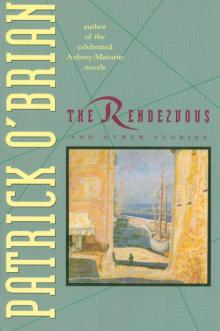 The Rendezvous and Other Stories
The Rendezvous and Other Stories Caesar: The Life Story of a Panda-Leopard
Caesar: The Life Story of a Panda-Leopard The Hundred Days
The Hundred Days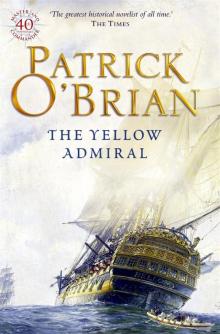 The Yellow Admiral
The Yellow Admiral The Fortune of War
The Fortune of War The Mauritius Command
The Mauritius Command Beasts Royal: Twelve Tales of Adventure
Beasts Royal: Twelve Tales of Adventure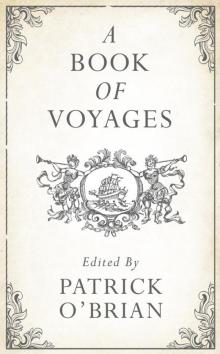 A Book of Voyages
A Book of Voyages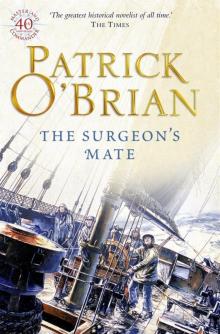 The Surgeon's Mate
The Surgeon's Mate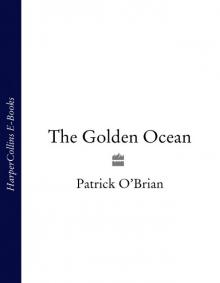 The Golden Ocean
The Golden Ocean Hussein: An Entertainment
Hussein: An Entertainment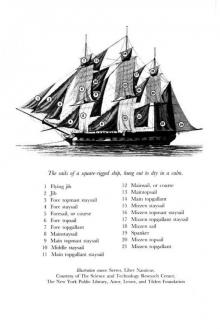 H.M.S. Surprise
H.M.S. Surprise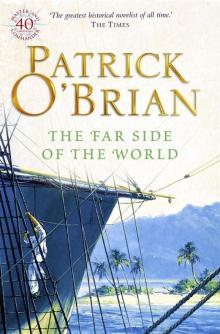 The Far Side of the World
The Far Side of the World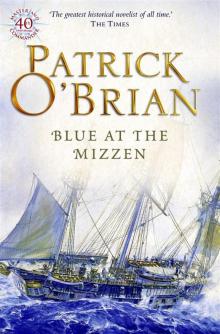 Blue at the Mizzen
Blue at the Mizzen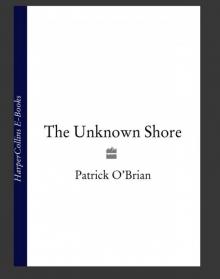 The Unknown Shore
The Unknown Shore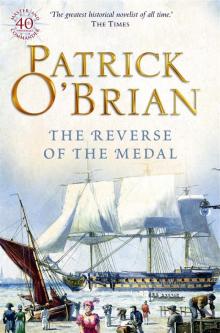 The Reverse of the Medal
The Reverse of the Medal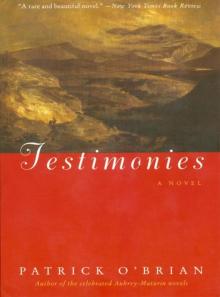 Testimonies
Testimonies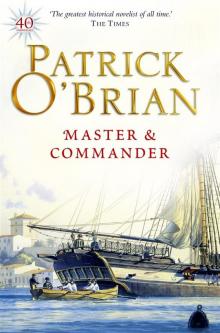 Master and Commander
Master and Commander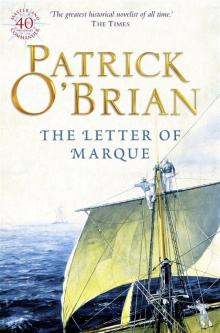 The Letter of Marque
The Letter of Marque Treason's Harbour
Treason's Harbour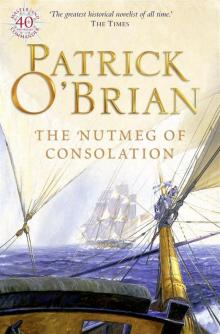 The Nutmeg of Consolation
The Nutmeg of Consolation 21: The Final Unfinished Voyage of Jack Aubrey
21: The Final Unfinished Voyage of Jack Aubrey The Thirteen-Gun Salute
The Thirteen-Gun Salute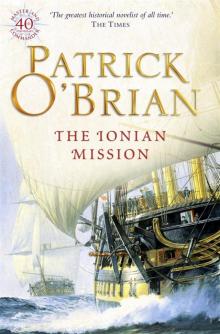 The Ionian Mission
The Ionian Mission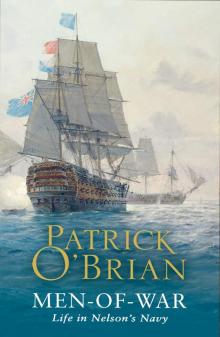 Men-of-War
Men-of-War The Commodore
The Commodore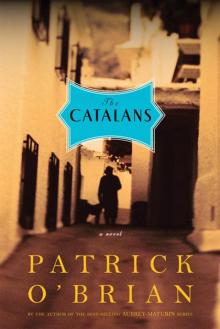 The Catalans
The Catalans Aub-Mat 08 - The Ionian Mission
Aub-Mat 08 - The Ionian Mission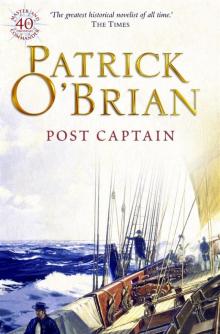 Post Captain
Post Captain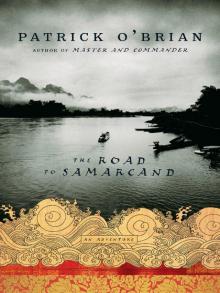 The Road to Samarcand
The Road to Samarcand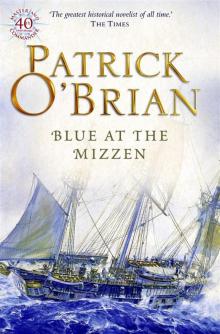 Book 20 - Blue At The Mizzen
Book 20 - Blue At The Mizzen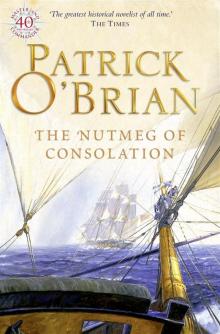 Book 14 - The Nutmeg Of Consolation
Book 14 - The Nutmeg Of Consolation Caesar
Caesar The Wine-Dark Sea
The Wine-Dark Sea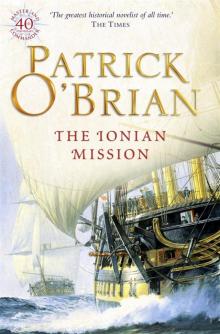 Book 8 - The Ionian Mission
Book 8 - The Ionian Mission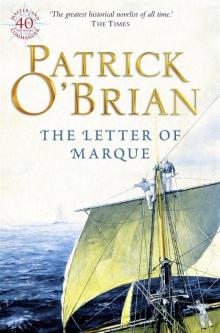 Book 12 - The Letter of Marque
Book 12 - The Letter of Marque Hussein
Hussein Book 9 - Treason's Harbour
Book 9 - Treason's Harbour Book 19 - The Hundred Days
Book 19 - The Hundred Days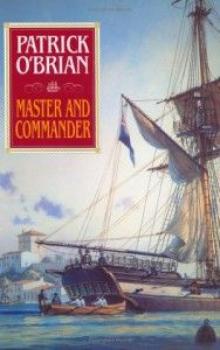 Master & Commander a-1
Master & Commander a-1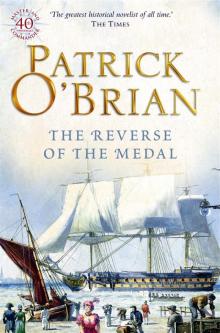 Book 11 - The Reverse Of The Medal
Book 11 - The Reverse Of The Medal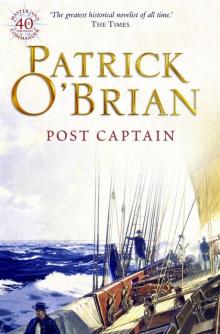 Book 2 - Post Captain
Book 2 - Post Captain The Truelove
The Truelove The Thirteen Gun Salute
The Thirteen Gun Salute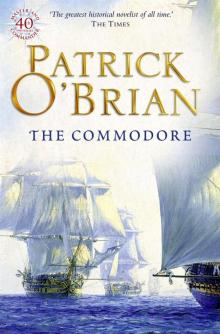 Book 17 - The Commodore
Book 17 - The Commodore The Final, Unfinished Voyage of Jack Aubrey
The Final, Unfinished Voyage of Jack Aubrey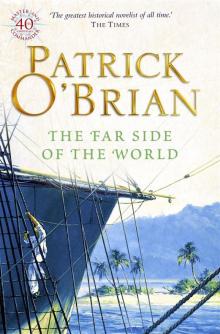 Book 10 - The Far Side Of The World
Book 10 - The Far Side Of The World Book 5 - Desolation Island
Book 5 - Desolation Island Beasts Royal
Beasts Royal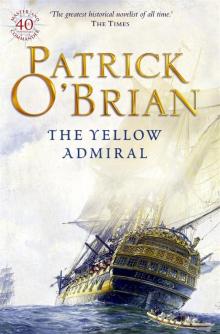 Book 18 - The Yellow Admiral
Book 18 - The Yellow Admiral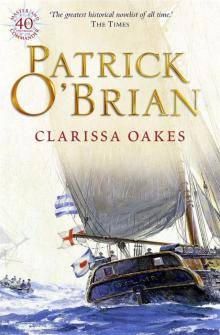 Book 15 - Clarissa Oakes
Book 15 - Clarissa Oakes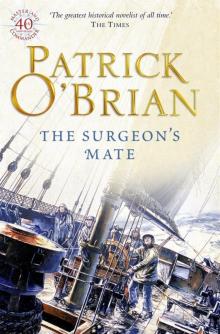 Book 7 - The Surgeon's Mate
Book 7 - The Surgeon's Mate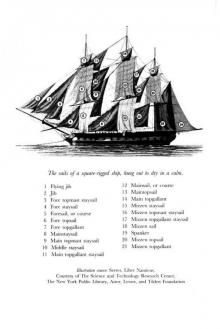 Book 3 - H.M.S. Surprise
Book 3 - H.M.S. Surprise Desolation island
Desolation island Picasso: A Biography
Picasso: A Biography Book 4 - The Mauritius Command
Book 4 - The Mauritius Command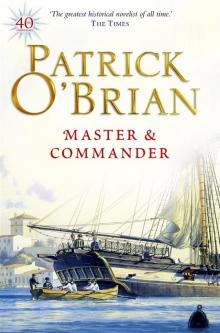 Book 1 - Master & Commander
Book 1 - Master & Commander Book 6 - The Fortune Of War
Book 6 - The Fortune Of War Book 13 - The Thirteen-Gun Salute
Book 13 - The Thirteen-Gun Salute Book 16 - The Wine-Dark Sea
Book 16 - The Wine-Dark Sea